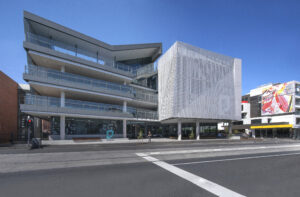
| Project | Prahran High School https://prahranhighschool.vic.edu.au |
| Aboriginal Nation | Built on the land of the Wurundjeri Woi Wurrung and Bunurong peoples of the East Kulin Nations |
| School vision/ mission | The core purpose of Prahran High School is for all students to learn and to develop the intellectual rigour and character required to make a positive impact in their world.
Our mission is to foster curiosity, creativity and empathy in the students in our care in order to develop young leaders of character and purpose who can confidently embrace life’s challenges and make a positive impact in their world. |
| Architect | Gray Puksand |
| Client | Victorian School Building Authority |
| Site details | 138 High Street, Windsor, Victoria, Australia |
| Staging | Single stage project Completed |
| Gross Floor Area | 9,200 sqm |
| Storeys | 5 levels |
| Site area | 2,500 sqm |
| Planning approvals | NA |
| Ratio of built space to green/open space | As the school is an inner city multi level campus, outdoor spaces were provided through upper-level rooftop areas and integrated terraces at each floor level. The ratio of these to the internal. Approximate ratio of this is 75% indoor/25% outdoor. |
| Other features and highlights | The school has been master planned acknowledging its location adjacent the Melbourne Polytechnic Campus, the National Institute of Circus Arts and its context within inner urban Prahran. Connected to multiple public transport links, the school is designed to collaborate with these adjacent educational institutions and community facilities, taking advantage of their proximity and offering opportunities for others to share spaces within Prahran High School.
The campus provides a full range of generalist and specialist learning environments including a learning resources centre and performing arts studios at ground levels and a full-size gymnasium at rooftop level. Rather than designing a straight-up-and-down building extending to the boundary on each side, the design team developed two ‘slipped and shifted’ planes around a the central light-filled atrium. By offsetting each level, the atrium evolves as it runs up through the building, exposing more spaces to natural light and providing unique learning spaces visible throughout the building – like a gallery of learning. Through use of glass and perforated screens through the central atrium, the design welcomes parents, students and visitors, directly exposing them to everything the school has to offer. Surrounding this central space, across all levels, learning environments have been planned to promote movement, interdisciplinary collaboration, visual and physical connectivity. Specialist spaces have been distributed across the central levels, directly connected to agile learning studios, to create neighbourhoods which provide a wide range of spaces to support small, medium and large groups. External terraces at the northern and southern ends of the building are also directly connected to the atrium and adjoining learning environments. Staff workspaces are distributed vertically and integrated with the key learning spaces. A series of broad bleachers and stairs at each end the main atrium promote continual and seamless movement between levels in addition to providing informal social and gathering spaces for students |
| Sustainability | The key sustainability objectives and concepts for the school include the following:
The sustainability design response for the proposed development may be summarised as follows:
|
| Opening date | Term One, January 2019 |
| Foundational principal | Nathan Chisholm |
| Student population at full capacity | Year 7 – Year 10 |
| Student population as at June 2022 | 650 students |
| Architect Project Team | Stephen Turner, Mark Freeman, Chris Scoble, Nick Shearman, Kara Thapar, Kristine Piggford |
| Furniture design | BFX Furniture |
| Consultants | SEMZ + Stantec + Tract + McKenzie Group + Cardno + Salus + Slattery |
| Type of procurement | Traditional Lump Sum |
| Cost | Construction Cost $41.0m |
| Awards |
|
| Other information | Take a virtual tour of Prahran High School via this link: https://my.matterport.com/show/?m=az5v5sKWnkH&brand=0 |